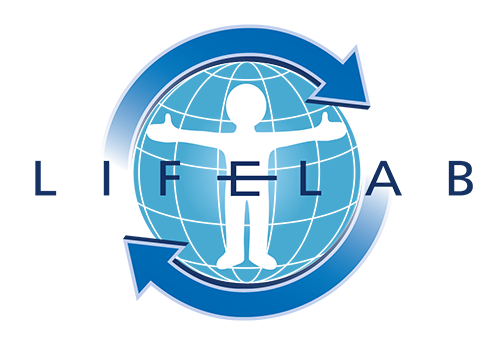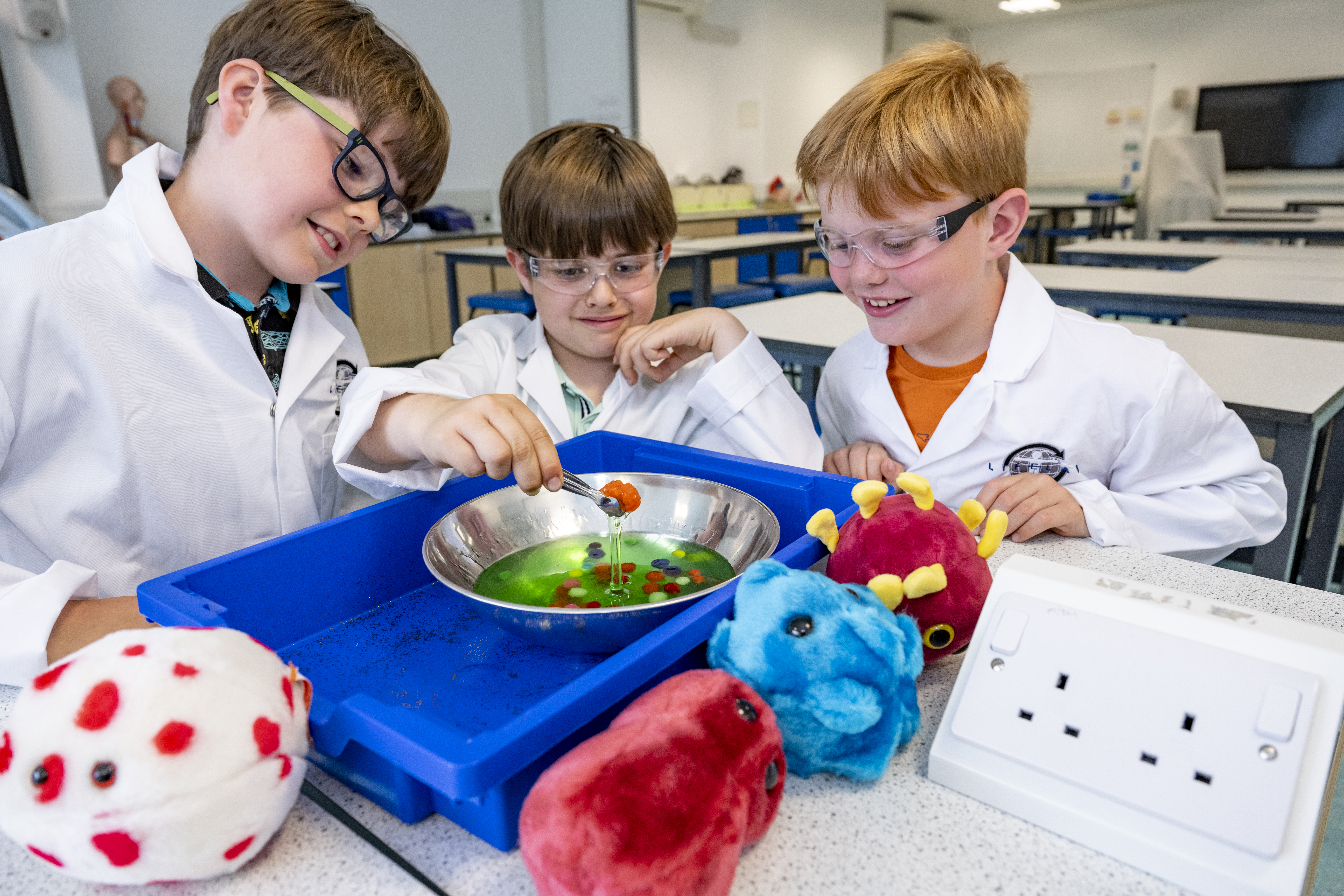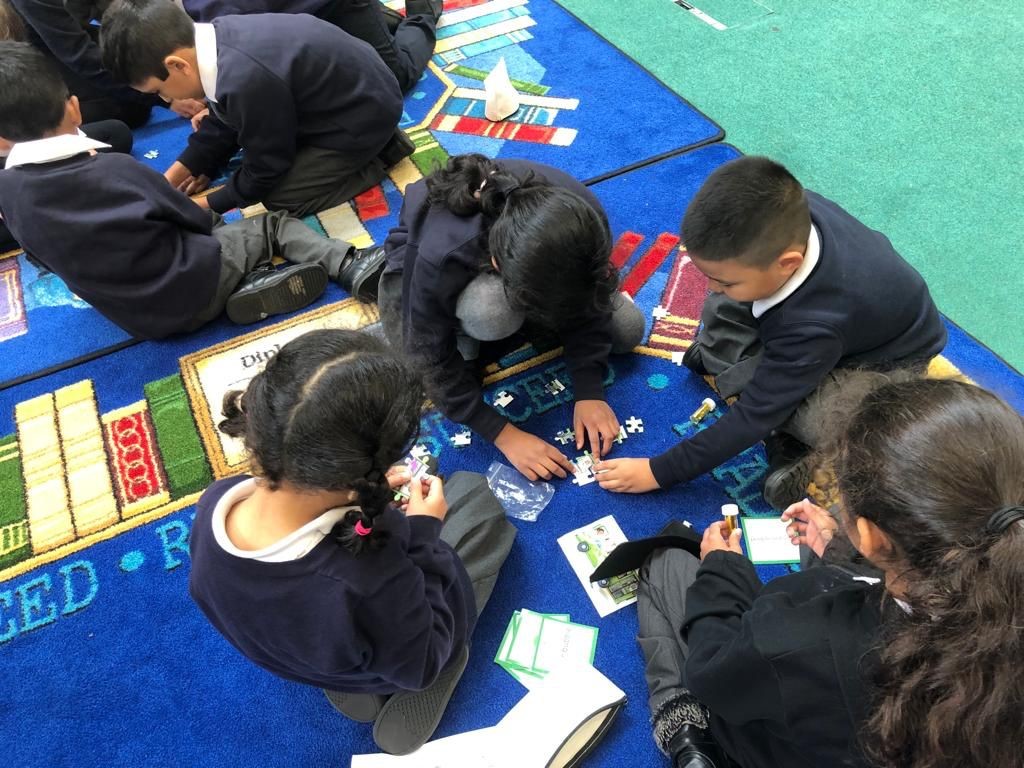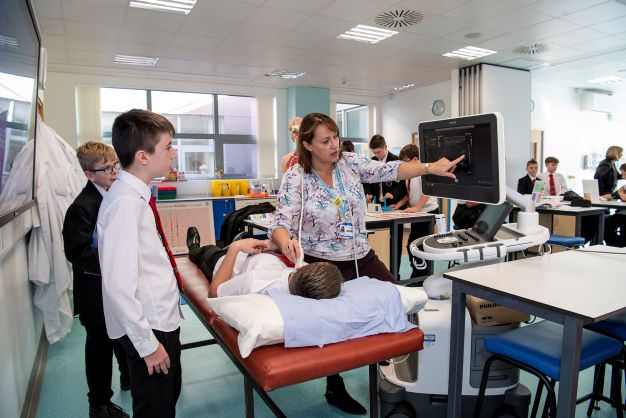
University of
Southampton initiative tackling childhood obesity to be rolled out across the
city
LifeLab at the University of Southampton has been awarded £200,000
by Southampton City Council to fund key work to tackle obesity among primary
school children in the city over the next three years.
In partnership with University Hospital Southampton NHS Foundation
Trust, the
University of Southampton Early
LifeLab programme aims to support behaviour change in children using a series of ‘teaching
toolkits’. These make the science behind the need for healthy diet, physical
activity and sleep accessible to children, helping them to discover why this
matters for themselves, supporting children and their families in making
healthy choices.
Professor Keith Godfrey, one of the
LifeLab programme directors and a lead researcher in the NIHR
Southampton Biomedical Research Centre, commented: “Childhood obesity in the UK is a
major public health problem. In 2019/2020, nearly one in four children in the
first year of primary school were overweight or obese. Over the course of the
pandemic, levels of overweight and obesity in children have seen a sharp worsening,
highlighting the need for new approaches.”
Dr Kath Woods-Townsend is the programme lead for Early LifeLab: “Tackling
obesity in children was already on our agenda at LifeLab pre COVID, but the
pandemic and its effects have brought the issue even more to the fore.
“Based on our well established and
successful LifeLab programme for secondary school students, Early LifeLab has 4
modules across the primary phase (Early Years, Keystage 1, Lower Keystage 2 and
Upper Keystage 2) that are delivered directly in schools. We know this is an
effective setting to reach a large population of children across all
communities, and we provide the tools teachers need to deliver health messages
in an engaging way.”

All primary phase settings in
Southampton can opt to take part in Early LifeLab. Participating schools will
receive a fully-resourced “flight case”, which contains all the
equipment, resources and teaching information needed to deliver the lessons.
Debbie Chase, Director of
Public Health at Southampton City Council said: “The opportunity for children
in the city to have access to the LifeLab resources is very much in line with
our work in early health prevention and education messages. Programmes like
this from LifeLab are essential in helping our community recover from the
pandemic and build positives outcomes for the future.”
This is an important collaboration
between Public Health at Southampton City Council, NIHR Southampton
Biomedical Research Centre, the University Hospital Southampton and the University,
in particular the Widening Participation and Social Mobility team who are
contributing direct funding in addition to the Council.
Kirsten
Wythe, Head of Access in the Widening Participation and Social Mobility team
said, “This project very much complements the work we do with younger children
and families, which is why we were keen to be involved. We are delighted to
have been able to provide funding to support the development of the resources,
and the work to transform the LifeLab COVID-19 Warriors into Health Warriors
with video content to reinforce the messages. We are looking forward to being
part of the project as it grows.”
At the height of the pandemic LifeLab
developed and implemented the successful COVID-19
Warriors programme with funding from the Department of Health and
Social Care.
In collaboration with primary school students, LifeLab created a
team of ‘COVID-19 Health Warriors’ and produced a series of short educational
videos and created a community that children, on completion of the programme,
could join. The project was endorsed by the Royal Society for Public Health,
who promoted it on their YouTube channel.
The initiative follows on from the University of Southampton commitment to help and support communities in Southampton and the
surrounding region. Professor Mark E. Smith, President and Vice-Chancellor
said: “We are delighted to be leading this collaborative activity to overcome
the challenges facing young children in local communities across Southampton.
The University’s research, education, alumni and outlook are global, but we are
rooted in our community and committed to forming closer links with local people
and organisations.”
Professor Jane Falkingham,
Vice-President International & Engagement of the University of Southampton,
added: “The University of Southampton has played important local and national
roles in supporting communities through the pandemic. Working with young people
to support the city’s recovery from the pandemic will be critical in helping
local communities thrive and we are delighted to be working with Southampton
City Council on this important initiative.”
The Council grant for Early LifeLab will run until 2025.
Ends.
Please contact Louise Payne, Communications Manager on
l.s.payne@soton.ac.uk for further information.

LifeLab provides COVID-19 teaching resource to London’s Science Museum
September 2022
LifeLab has provided one of its escape room activities for primary schools to the Science Museum to become part of the Science Museum Group Collection, one of the most significant scientific collections in the world.
The LifeLab resource was acquired through the museum’s COVID-19 Collecting Project, which aims to collect items reflecting medical, public health, industrial and scientific responses to the COVID-19 pandemic.
In August 2020, as part of the saliva-based RT-LAMP testing that was being piloted at the time in Southampton education settings, the LifeLab team developed an escape room activity that teachers could use with their primary school pupils to support children in understanding the COVID-19 pandemic and the rules and guidelines we were all being asked to follow.
Through six activities, children engaged with a different aspect of COVID-19, including identifying the shape of the virus, social distancing, hand washing and face coverings. At the end of the escape room, they watched a video about the journey their saliva would go on to be tested for COVID-19 to understand more about the process. The activities were delivered in school by teachers the day before saliva testing was to start and ended with the pupils being issued with their testing packs to take home. Several local schools took part including Mount Pleasant Junior School, Maytree Nursery and Infant School and Swaythling Primary School, all of which are part of the Aspire Community Trust.

The activities contributed to an important impact of the testing programme, which increased confidence in school attendance among students, parents and staff, notably in schools with a high proportion of students from disadvantaged backgrounds and for whom English is not their first language. The programme resulted in a substantial increase in school attendance, with its attendant benefits for the wellbeing and education of the students.
The Science Museum Group cares for this vast and varied collection on the nation's behalf, which contains 7.3 million items (around 425,000 objects and millions of photographs and archive materials) related to science, technology, engineering and medicine. These items provide a remarkable record of human imagination and ingenuity, featuring objects which have changed the way we live, work and think.
Objects in the collection such as the LifeLab escape room are often the subject of research, loaned to other museums or featured in upcoming exhibitions and galleries.
Further detail about the item can be found here.
May 2021
A study by the University of
Southampton has shown that its LifeLab programme, aimed at improving adolescent
health through hands-on learning, significantly increases young people’s
understanding of what it means to lead a healthy lifestyle.
Led by a team from both the Faculty
of Medicine and Education School at the University of Southampton, the LifeLab
programme aims to encourage engagement with the science behind public health
messages, to support development of health literacy alongside decision-making
skills and promotion of adolescents’ sense of control over their lives and
futures. Based at University Hospital Southampton (UHS) NHS Foundation Trust,
LifeLab is a state-of-the-art teaching laboratory dedicated to improving
adolescent health through science engagement.
Latest research, published in the
journal PLoS One and funded by the British Heart Foundation, has
found that participation in LifeLab was associated with an increase in
students’ health literacy 12 months later. There was also evidence that
participants subsequently judged their own lifestyles more critically than
students who had not taken part in the programme.

School children taking part in LifeLab (pre-pandemic)
Health literacy means having the knowledge, skills, understanding and confidence to use health & care information and services, and to apply these to lifestyle choices.
Increasing evidence suggests that adolescence is a critical developmental stage
during which lifelong health literacy can be established. This presents an important window of opportunity during which improvements in health literacy could
benefit long-term health, and enable preparation for parenthood – passing on
good health prospects to future children.
The randomised controlled trial
was conducted in 38 secondary schools in England, drawing on principles of
education, psychology and public health to engage students with science for
health literacy, focused on the message ‘Me, my health and my children’s health’.
The programme comprised a professional development day for teachers, a two to
three week module of work for 13-14-year-olds and a ‘hands-on’ practical health
science day visit to a dedicated facility in a university teaching hospital.
Information was collected from 2929 adolescents aged 13-14 years, at baseline
and 2487 at follow-up 12-months later.
Comments
Dr Kath Woods-Townsend, LifeLab programme Lead: “Experiencing LifeLab led to
improved health literacy in adolescents and a move towards a more critical
judgement of health behaviour 12 months after the intervention. By providing opportunities
linked to the National Curriculum, and which meet schools’ needs, we have shown
that students can be successfully engaged with the science behind the health
messages, with lasting benefits for their health literacy.”
Professor
Hazel Inskip, principal investigator on the study from the Medical Research
Council Lifecourse Epidemiology Unit at the University of Southampton: “The
importance of health literacy in young people is being increasingly recognised,
but there are very few randomised controlled trials seeking to assess interventions
that promote health literacy through working in partnership with schools. It is
an exciting step forwards to show that such a programme can engage adolescents
with science, leading to sustained changes in health literacy and more critical
judgement of their own behaviour.”
Professor Keith Godfrey, a
co-investigator on the study from the National Institute for Health Research
Southampton Biomedical Research Centre: “Interventions during adolescence
have the potential for a ‘triple dividend’ of benefits now, into future adult
life and for the next generation of children. The LifeLab programme paves the
way for enabling young people to access, understand and reflect on what they
need to do to live healthier lives.”

Budding young film makers urge their communities not to let down their guard as restrictions ease
March 2021
View our coverage on ITV, & the BBC (01:08-02:08)
Young people across the south have turned their hand to creating films in an effort to urge their peers to continue keeping themselves and their communities safe from the spread of COVID-19.
Funded by Southampton City Council's COVID-19 Innovations Grant, which supports projects that target hard-to-reach groups and groups where COVID-19 is highest or may increase, organisations including LifeLab and Southampton Children’s Hospital at University Hospital Southampton brought young people and professional filmmakers together.
LifeLab, a University of Southampton education programme for young people discovering the science behind health messages, and Southampton Children’s Hospital worked with young people in schools, colleges and youth groups to produce short films with the help of professional production companies.
Together they co-created a range of films with messaging around the importance of sticking to the guidance and reflecting on life in lockdown in a range of different styles.
Young actors from Richard Taunton Sixth Form College and Itchen College participated in the films that were produced by Robin Creative Media with the help of students from Toynbee School in Eastleigh.
Separately students at Cantell School in Southampton created a video with clips submitted by students to demonstrate how young people were making a difference with support from Southpoint Films.
The Southampton Children’s Hospital Youth Ambassador Group (YAG) used their funding to produce a collection of three films with education and development film makers, In Focus. The films give a young person’s view on the impact of COVID-19 and cover topics including public health messaging and wellbeing through poetry and animation.
YAG is made up of young people aged 11 to 17 from across the South who have a connection to the hospital either as a patient or relative and who want to get involved and improve services for young people.
If you enjoyed the films in this post, you can find the full collection now released on our social media channels.
Please use the #bepartofthesolution when sharing on social channels.
Comments
Ipsa Dash, a youth ambassador, said: “During these unprecedented times, it felt like nothing was in our control what with the never ending uncertainty but I believe this project made me realise we really could make a difference. I am really pleased with the outcome.”
Dr Kathryn Woods-Townsend, programme lead for LifeLab, said: “These projects were about giving young people ownership of messaging that affects them. This was a great opportunity for them to shape the sort of communications they want to see when it comes to their own health and that of their community.”
Louisa Green, divisional head of nursing and professions for SCH, said: “These videos are a wonderful example of how committed our young ambassadors are in making a difference to the health and wellbeing of their communities. The films have some really strong messaging around the impact Covid on young people but also their commitment to keep going with following the guidance as restrictions ease.
“Projects like these really help us towards our goal of our COVID ZERO campaign, having no transmission of the virus within our hospitals, and the community have a vital part of play in that.”
Debbie Chase Director of Public Health at Southampton City Council said: “My thanks to all the young people involved in developing these films. They are both creative and powerful in their messaging. We know that how a message is conveyed, and the way it makes us feel, is important in shaping safe and healthy attitudes and behaviours. These films have been created by young people for young people and form part of a selection of videos created by members of Southampton communities for our communities. We all have a responsibility to stay safe as restrictions ease and it's also important that we help our families, peers, work colleagues and local communities to do the same."
Royal Society for Public Health (RSPH)
February 2021
In a piece of work funded by the Department of Health and Social Care, RSPH has collaborated with the LifeLab & the University of Southampton in the development of the RSPH Level 2 Award for COVID-19 Young Health Champions. This qualification is designed to support young people in secondary schools to understand the purpose and the importance of measures in place to prevent the spread of COVID-19, giving them the tools and education to make informed choices about their health and wellbeing.
This project is part of the work undertaken in Southampton to pilot a saliva testing programme for COVID-19. This has included testing taking place in educational settings in the city, such as schools, colleges and universities. The educational resources designed through this project are intended to help young people to understand how to engage in this testing process, as well as to deepen their understanding of the wider measures in place in schools and across wider society to prevent the spread of COVID-19.
Meet our Covid Warriors
December 2020
Artistic students have been getting creative by designing COVID-19 Warriors as part of our work supporting schools that are taking part in the saliva project.
Young people were set the challenge of coming up with an imaginative character who could battle the virus using their superpowers and defeat COVID-19. We got an overwhelming response with more than 170 students submitting their ideas.
The project team will be using some of the designs to create a team of COVID-19 Warriors to help us all defeat the virus and make good choices. Our team of Superheroes will have capes, masks and a toolbelt containing all the items they need to stay safe – just like in these brilliant designs.
The characters will then be used as part of the teaching programme we will be delivering to more young people as the programme expands.